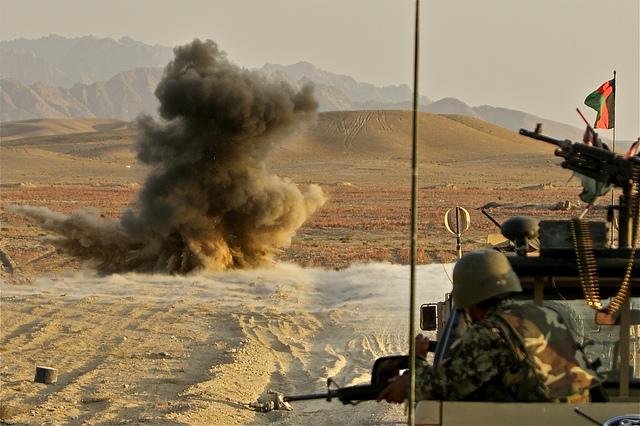The Counterterrorism Yearbook 2017: is terrorism an existential threat?
Posted By Peter Jennings on April 13, 2017 @ 06:00

It’s often been claimed that terrorism doesn’t present an existential threat to the survival of the nation-state. Former vice president of the United States, Joe Biden, took this view [1], which he claimed helped to keep a sense of ‘proportionality’ about American CT responses:
‘… terrorism is a real threat, but it’s not an existential threat to the existence of the democratic country of the United States of America. Terrorism can cause real problems. It can undermine confidence. It can kill relatively large numbers of people. But terrorism is not an existential threat.’
Two arguments can be put against Biden’s view. The first is that widespread fear of terrorism certainly contributed to system-changing political movements in 2016 that called into question the viability of some long-cherished institutions, such as the EU and the EU’s Schengen border-free area.
Terrorism has contributed to the rise of populist political movements in France, Germany and other European countries, which may further undermine the EU and bring an end to relatively liberal policies on accepting refugees, close previously uncontrolled borders and weaken multiculturalism. Although hardly the sole, or even a main cause, fear of terrorism boosted Donald Trump’s election campaign and was surely an existential threat to the electoral prospects of the US Democratic Party’s candidate, Hillary Clinton.
In the Middle East and North Africa, terrorism has certainly become an existential threat to the balance of power that used to prevail in the region. It has led to the destruction of Syria, Iraq and Yemen and continued to put a number of established regimes under threat. Terrorism has been used as a rationale for governments in Turkey, Bahrain, Saudi Arabia and elsewhere to become internally more repressive and is being used by a number of countries as a proxy means to weaken external rivals.
A second argument against Biden’s view is that western governments should still worry about the possibility that terrorist groups will seek access to weapons of mass destruction (WMDs). There’s some limited evidence to suggest that IS has tried to use WMD agents where it can. An artillery round containing mustard gas was fired onto the Qayyara air base south of Mosul in September 2016. What limited evidence there is of WMD attacks using mustard gas or chlorine in Iraq and Syria shows that the effect is limited, although terrible for the individuals involved.
US concern about the potential for nuclear terrorism remains substantial, although it’s based more on a theoretical possibility than on strong evidence of terror groups trying to develop such capabilities. At the fourth and possibly last Nuclear Security Summit held in Washington DC in April 2016, the summit communiqué said that ‘the threat of nuclear and radiological terrorism remains one of the greatest challenges to international security and the threat is constantly evolving.’ It’s a threat that particularly galvanises India, whose leaders worry that ‘insider threats’ in the Pakistan military might see a nuclear weapon transferred to terrorist organisations threatening India.
For all of the concerns in senior political circles, if a radiological dirty bomb were detonated in a US city, Joe Biden’s claim would still hold that such an attack wasn’t a threat to the American system of government. Then again, President Trump is now in the Oval Office. We shouldn’t underestimate the system-changing power of terrorism and the fear of mass-casualty attacks. The implication behind dismissing terrorism as not being an existential threat is that societies may just have to accept that some level of risk is inevitable. That’s an unproductive way of thinking about CT and one that may well have contributed to the Obama administration’s drift on this issue towards the end of its second term.
The arrival of the Trump administration and the half-completed fight to retake Mosul provide two natural reasons for CT policymakers to pause briefly and reflect on what the priorities should be for 2017. The first task, surely, is to redevelop a sense of common purpose among the Western and Middle Eastern partners in the military campaign against IS.
The US remains the decisive military force in the campaign, and President Trump’s appetite for a more aggressive fight in Iraq and Syria will set the momentum for operations. Consolidating Iraq’s hold over all of Mosul will be an early critical task, followed by the need to destroy pockets of IS support in other parts of central and western Iraq. Syria is no closer to any viable peaceful solution and, regrettably, violence there will continue.
The next high-priority task will be to prepare for what looks to be a much more distributed and traditional CT fight around the world, from Paris to the Sulu Sea. The IS network remains intact, is quite sophisticated, is good at developing local support and has a large cohort of fighters who have been through a hardening experience in Iraq and Syria. Putting this diaspora down will be the major focus of CT in 2017.
By comparison with many countries, Australia’s domestic position is good. As the Prime Minister frequently says, our police and security agencies are among the best in the world, our geography gives us some protection, and successive governments have worked hard to have the necessary laws and regulations in place to support modern CT practices.
None of this offers room for complacency. We’ll need to redouble our efforts in CT cooperation with the countries of Southeast Asia, and we’re likely to be called on to do more rather than less with our military presence in the Middle East. For CT operators and policymakers, 2017 will be a demanding year.
Article printed from The Strategist: https://aspistrategist.ru
URL to article: /terrorism-existential-threat/
URLs in this post:
[1] took this view: https://www.theatlantic.com/international/archive/2016/08/joe-biden-interview/497633/
Click here to print.